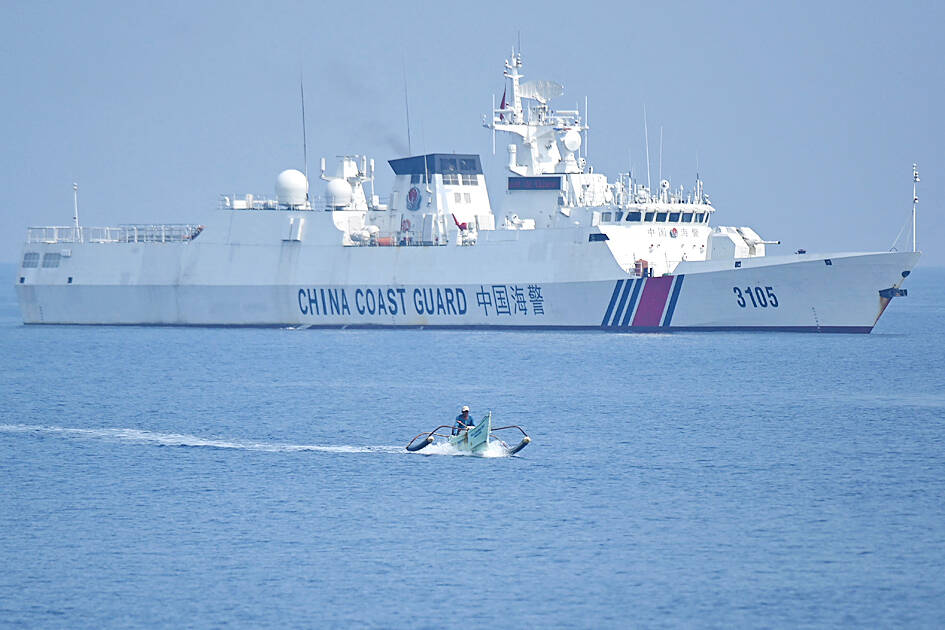The China Coast Guard has installed a “floating barrier” in a disputed area of the South China Sea, which is preventing Filipino fishers from entering the area, Manila said yesterday.
The Philippine Coast Guard and the Philippine Bureau of Fisheries and Aquatic Resources “strongly condemn” China’s installation of the barrier in part of the Scarborough Shoal (Huangyan Island, 黃岩島), Philippine Coast Guard spokesman Commodore Jay Tarriela wrote on X, formerly Twitter.
The barrier blocking fishers from the shoal was depriving them of their fishing and livelihood activities, he said.

Photo: AFP
“The [Philippine Coast Guard] will continue to work closely with all concerned government agencies to address these challenges, uphold our maritime rights and protect our maritime domains,” Tarriela said.
The Chinese embassy in Manila did not immediately reply to requests for comment.
China claims 90 percent of the South China Sea, overlapping with the exclusive economic zones of Vietnam, Malaysia, Brunei, Indonesia and the Philippines.
Beijing seized the Scarborough Shoal, which Taiwan also claims, in 2012 and forced fishers from the Philippines to travel further for smaller catches.
Beijing allowed Filipino fishers to return to the uninhabited shoal when bilateral relations were improving markedly under then-Philippine president Rodrigo Duterte, but tension has mounted again since Philippine President Ferdinand Marcos Jr took office last year.
Philippine Coast Guard and fisheries bureau personnel on Friday discovered the floating barrier, estimated to be 300m long, on a routine patrol near the shoal, locally known as Bajo de Masinloc, Tarriela said.
Three China Coast Guard rigid-hull inflatable boats and a Chinese maritime militia service boat installed the barrier when the Philippine vessel arrived, he said.
Filipino fishers say that China typically installs such barriers when they monitor a large number of fishers in the area, Tarriela said.
The Chinese boats issued 15 radio challenges and accused the Philippine ship and fishers of contravening international and Chinese laws, before moving away “upon realizing the presence of media personnel on board the [Filipino] vessel,” he said.

A Chinese aircraft carrier group entered Japan’s economic waters over the weekend, before exiting to conduct drills involving fighter jets, the Japanese Ministry of Defense said yesterday. The Liaoning aircraft carrier, two missile destroyers and one fast combat supply ship sailed about 300km southwest of Japan’s easternmost island of Minamitori on Saturday, a ministry statement said. It was the first time a Chinese aircraft carrier had entered that part of Japan’s exclusive economic zone (EEZ), a ministry spokesman said. “We think the Chinese military is trying to improve its operational capability and ability to conduct operations in distant areas,” the spokesman said. China’s growing

Nine retired generals from Taiwan, Japan and the US have been invited to participate in a tabletop exercise hosted by the Taipei School of Economics and Political Science Foundation tomorrow and Wednesday that simulates a potential Chinese invasion of Taiwan in 2030, the foundation said yesterday. The five retired Taiwanese generals would include retired admiral Lee Hsi-min (李喜明), joined by retired US Navy admiral Michael Mullen and former chief of staff of the Japan Self-Defense Forces general Shigeru Iwasaki, it said. The simulation aims to offer strategic insights into regional security and peace in the Taiwan Strait, it added. Foundation chair Huang Huang-hsiung

PUBLIC WARNING: The two students had been tricked into going to Hong Kong for a ‘high-paying’ job, which sent them to a scam center in Cambodia Police warned the public not to trust job advertisements touting high pay abroad following the return of two college students over the weekend who had been trafficked and forced to work at a cyberscam center in Cambodia. The two victims, surnamed Lee (李), 18, and Lin (林), 19, were interviewed by police after landing in Taiwan on Saturday. Taichung’s Chingshui Police Precinct said in a statement yesterday that the two students are good friends, and Lin had suspended her studies after seeing the ad promising good pay to work in Hong Kong. Lee’s grandfather on Thursday reported to police that Lee had sent

BUILDUP: US General Dan Caine said Chinese military maneuvers are not routine exercises, but instead are ‘rehearsals for a forced unification’ with Taiwan China poses an increasingly aggressive threat to the US and deterring Beijing is the Pentagon’s top regional priority amid its rapid military buildup and invasion drills near Taiwan, US Secretary of Defense Pete Hegseth said on Tuesday. “Our pacing threat is communist China,” Hegseth told the US House of Representatives Appropriations Subcommittee on Defense during an oversight hearing with US General Dan Caine, chairman of the Joint Chiefs of Staff. “Beijing is preparing for war in the Indo-Pacific as part of its broader strategy to dominate that region and then the world,” Hegseth said, adding that if it succeeds, it could derail